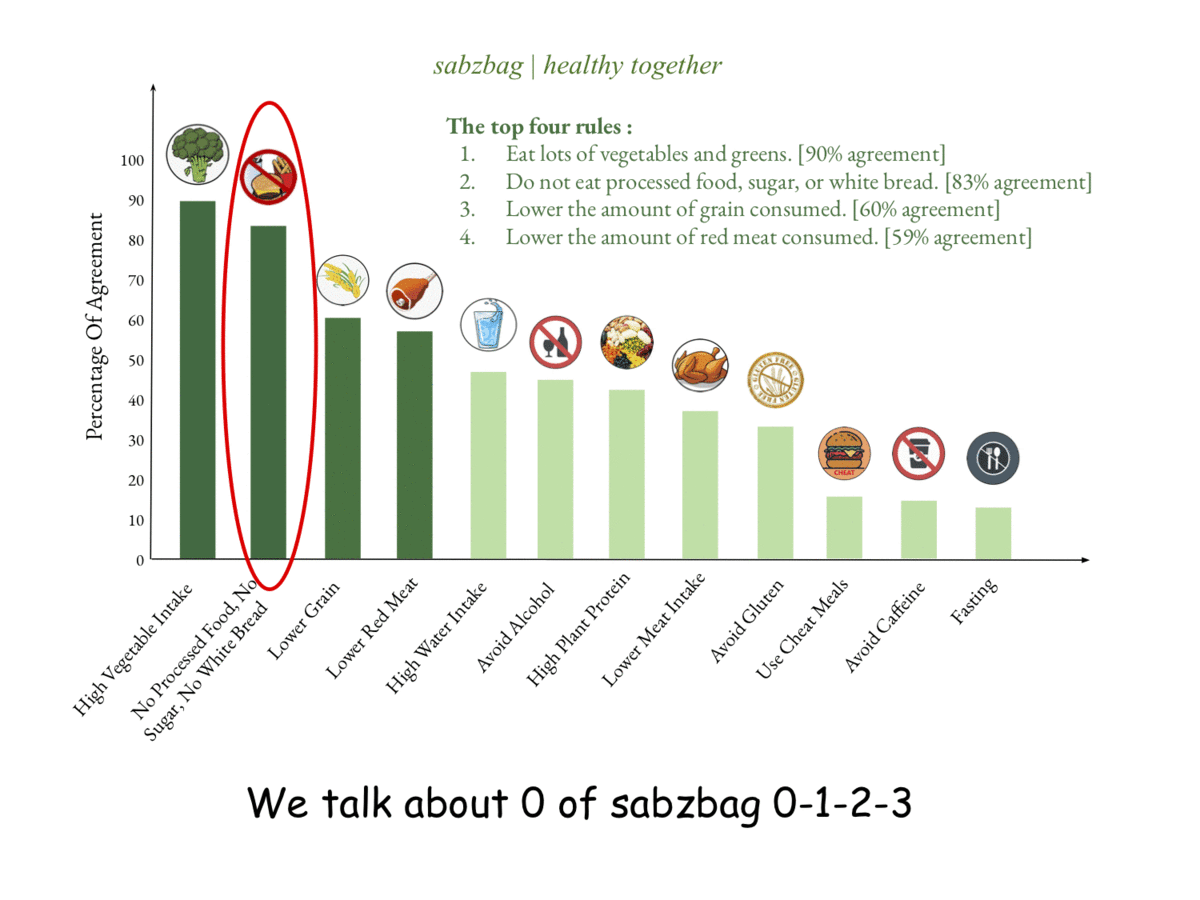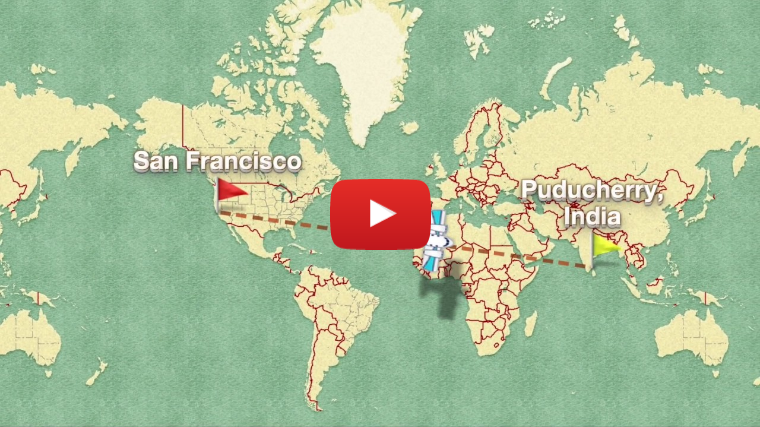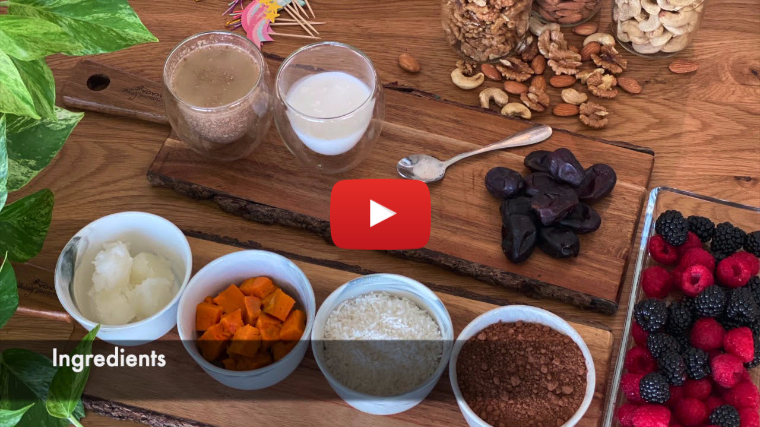Sabzbag February 2020 Newsletter |
|
|
|
The most important 0 in nutrition: a deep dive into the 0 of Sabzbag 0-1-2-3:
|
|
|
|
How can 0 help me get healthier and leaner?
0 or nil, zip, zilch, sifr(Arabic), shoonya(Sanskrit) - one of the most simple and powerful concepts in math is equally powerful in health. 0 is the right amount of junk or ultra-processed food - really lab concoctions which have fiber removed and sugar, salt, fats and many chemicals added - that we should eat to remain lean and healthy. This is advice on which 83% of the best-selling nutrition books, medical experts and scientists, and respected bodies like the WHO agree as shown in our infographic in the previous issue. In fact the Pan American Health Organization (PAHO) and the WHO point out that simply knowing the percentage of ultra-processed products in a population's food supplies is enough to judge how good (if low % ultra-processed foods) or bad (if high % of ultra processed foods) their diet is.
To get a first-hand feel of how food is weaponized by huge research labs of scientists and savvy marketers dedicated to hacking our body and our mind, we will tell you a story: The tragedy of a potato chip! How a humble potato with some nutritional value was transformed into an industrial product called a potato chip, with its payload of excess salt, sugar, and fat, along with all sorts of chemicals that delivers profits to the corporations, and cravings, bad health and obesity (the #1 association!) to us.
So what can we do? We discovered something wonderful - we do not need the "bad stuff" to enjoy our food! Just a little bit of awareness, effort, and community support. For an example, we include a recipe developed by one of our members' moms for making chocolate brownies with 0 sugar and refined flour. It looks great and was certified delicious by more than a 100 people at our live events!
And now, enjoy our um.... excellent :) art work (any real artists out there, we need you!) in depicting the tragedy of the potato chip below.
|
 |
|
|
|
|
Defining processed and ultra-processed or junk foods.
We searched for a clear definition that is also scientific and intuitive to reduce confusion and make it easier for us to apply in real life. Accordingly, we found a system called NOVA (recognized by the WHO, FAO, and the PAHO but not the USDA) that categorizes foods in 4 different categories:
1) Unprocessed or Minimally processed foods: Include the natural edible food parts of plants and animals that are either totally unchanged or just cleaned, frozen, or ground for better storage.
2) Processed culinary ingredients: Food ingredients derived from a minimally processed food by pressing, refining, grinding, or milling such as oils or pasta. They are typically not eaten on their own.
3) Processed foods: Foods from either of the two previous groups that have added salt, sugar, or fats such as bread or cheese.
4) Ultra-processed foods: Industrial formulations that typically contain little or no whole foods, and are fatty, salty or sugary and contain artificial colors and flavors and preservatives to make it easy to store for a long time and to increase cravings. These are depleted in dietary fibre, protein, various micronutrients and other bioactive compounds. Examples include: ice cream, soda, chocolates, French fries, fish nuggets etc.
|
|
|
|
The harmful effects of sugar, salt, fat and ultra-processed foods
Refined starches and sugar cause glucose levels in the blood to spike and these spikes cause people to crave more food for as long as the next four hours, and makes the reward centers in the brain to "light up." These effects are so strong that they can be considered addictive by some. As you might guess ,just because sugar makes us happy, it does not mean it is good for us! The Eat-Lancet meta-study seems pretty clear on the topic:
Sugar, like refined starches, has multiple adverse metabolic effects, and at high intakes might further increase plasma triglyceride concentrations. High intakes of added sugars, especially sugar-sweetened beverages, have been associated with weight gain, type 2 diabetes, and increased cardiovascular mortality.
Salt jolts the taste buds which makes food tastier but excess salt (more than 5 g/day) increases blood pressure and the the risk of cardiovascular diseases.
Fat is the most dense in calories (9/gram vs. 4/gram for proteins and carbohydrates) and makes people overeat. Trans fat (such as the one in hydrogenated vegetable oils) increases the risk of coronary artery disease in part by raising the "bad cholesterol" (LDL) and lowering the "good cholesterol" (HDL).
Experts agree that the consumption of ultra-processed foods is associated with us getting fat and leads to a host of other diseases:
"Ecological studies and cross-sectional and cohort studies have documented a direct association between ultra-processed products and obesity, hypertension, metabolic syndrome and dyslipidaemias."
Naughty and Nice Foods
The chart on the right excerpted from the June 23, 2011 issue of the New England Journal of Medicine shows that among foods, potato chips consumption is associated with the highest weight gain in a 20 year long study of 120,877 U.S. women and men. It also shows that eating vegetables, whole grains, and nuts is associated with weight loss.
|
|
|
FAQ
What kind of chemical additives are we talking about? An example is acrylamide that has been linked to kidney, endometrial, ovarian, and human breast cancer. This neurotoxic industrial chemical is created when we fry carbohydrates such French fries. It is also present in potato chips and Frito-Lay and other companies had to settle a lawsuit over it.
Why have corporate revenue and health have moved in the opposite direction?
Corporations are not in charge of our long-term health but are beholden to share holders and to maximize revenue. If they can "hack" our taste buds to make their product more palatable and hence get the customer to buy it, they will- as pulitzer prize winning journalist Michael Moss points out in his New York Times bestselling book, Salt Sugar Fat: How the Food Giants Hooked Us.
In a sense food corporations are simply doing their job by making their product as craveable and convenient as possible to obtain and consume, lowering the cost, managing any health fears the consumer might have (for instance by highlighting something as low fat while it is extremely high in salt and sugar) and minimizing any quality issues. In Moss's book, one of the scientists wrote this out as an equation:
$ = a1*Taste + a2*Convenience + a3*Utilitarian - b1*Cost - b2*Health Perception - b1*Quality Issues
We can turn tables by "hacking" their equation :) - making healthy foods convenient and cheap, as well as moving from the health perception via marketing to informing ourselves of the basics! Thus it is all of our challenge to learn to produce tasty, convenient, and low cost foods that are also health promoting.
But what if I sometimes eat junk?
We all do! No problem. In our community we find that as we inform ourselves and find ways to combine the thousands of natural foods for wonderful flavors, our junk consumption naturally gets lower. We mostly focus on enjoying the good stuff.
Will my taste buds really adapt if I stop eating this junk?
Yes. For instance, a study finds that as we lower the amount of salt in the food, our preference changes! Nutritionfacts.org has an excellent video on how upon lowering salt, sugar, and fat we consume, our taste buds start to change and our tongue actually becomes more sensitive, which makes us like the healthy food more.
What is your favorite trick to lower junk consumption?
Our favorite trick to lower junk consumption is to set a time bound target of say 6 weeks where we all agree to not keep any junk at home. Using our app we also record how much junk we eat outside over that time. The finite ending point of 6 weeks makes it easier to commit to this and community support helps us stay strong. Usually we find that we did not miss junk much and our taste buds came alive and our habits changed for the better. Thus we gain a little more self-confidence and feel empowered to tackle the next challenge. And we definitely do not beat ourselves up if we do eat a little naughty! Just stay focused on improving slowly.
|
|
|
|
|
|
Travel Diaries : Puducherry |
It's easy to gain weight during a vacation especially when there's a lack of healthy options and an abundance of "party" or junk food. We went to a resort in Puducherry and found ourselves in the middle of a lot of deep-fried grains and vegetables. Watch the video below to see how we ate healthy while vacationing.
|
 |
|
|
|
|
|
Valentines Day Sweets
February! The time when love and sugar loaded chocolates are in the air. So we thought why not impress our Valentines by making a healthy and yummy chocolate concoction! Checkout our brownie recipe that requires 0 sugar and 0 flour.
|
 |
|
|
|
|
|
|
|
|
|
Community Corner
Continuing our ongoing report on our own health performance and our belief that social interaction boosts healthy activity and lifestyle we are into our sixth month of the endeavour. We saw a rise in January, post the holiday slump, and February has continued the overall rising pattern. And as soon as we can fix some of the inevitable bugs in our new app, some of our users who couldn't report their metrics would be able to submit their data and the graph would only rise more. The interesting thing is that the social interaction (the # of messages) and the overall community health (the health score) are still moving together as has been reported in multiple research studies, including the excellent Social Physics (page 92).
|
|
|
|
|
|
We will never spam you or sell your data to anyone. Ever. Unsubscribe at anytime. Feel free to forward to friends. |
| Sign up for our newsletter |
|
|
|
|